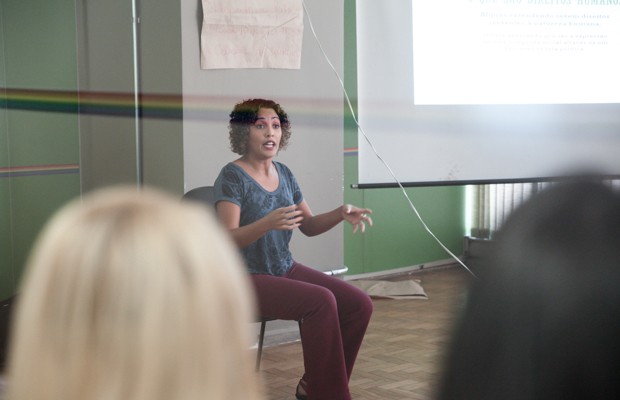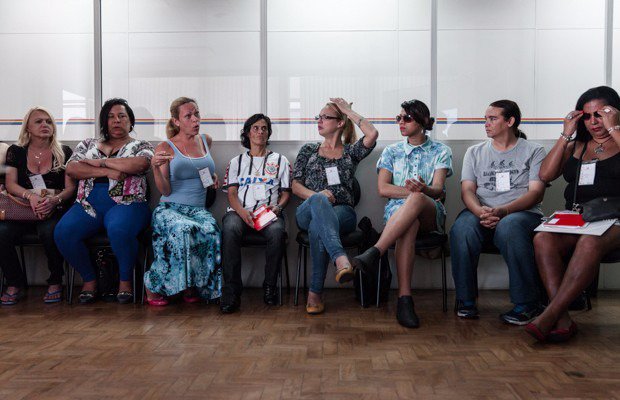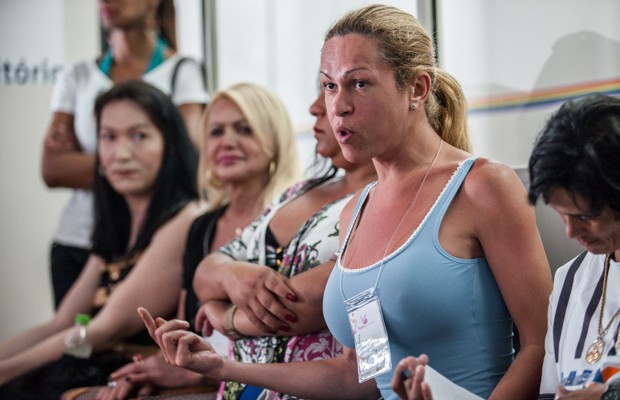‘I Want Decent Work’
[Original article in Portuguese]
Six months ago, Aline Marques started to see more of the sunlight. Instead of working the nights in São Paulo, she now wakes up early, goes to school, is greeted by her classmates and gets hugged at work. Aline says her new routine is "pure happiness"—and by happiness she means not being humiliated, threatened or beaten.
Aline is one of the 100 transgender people who participate in Transcidadania, a pilot project of São Paulo city that gives a scholarship of R$827.40 [about $165 dollars] for those who attend 30 hours of classes weekly. G1 followed the group's classes and activities for a month and interviewed ten participants. Watch the video with their stories.
In addition to attending school (86% did not finish primary education), the participants receive psychological, pedagogical and medical care. The focus of the program is people in vulnerable situations: 85% live in shared rooms, with pimps or in cheap hotels, 6% are in shelters, 5% in informal occupied areas and 4% are homeless. One of the requirements for joining the program is participants must have been without regular employment for at least three years.

Instructor Sula Assunção during a Transcidadania class (Marcelo Brandt/G1)
Six months after launching, the program’s attrition rate is 10%. In addition to the ten who left, three other people exited the program after being arrested, one got a job and one died (shot by a “client” while working as a sex worker). More than a thousand people have registered for the waiting list, and 171 were already selected to participate next year.
The compulsory 30 hours are filled by school activities and courses taught at the LGBTQA+ Citizenship Center, recently opened in Largo do Arouche. Rooms are full (absences are deducted from payment) and teachers often find it difficult to cope with students' anxiety for speaking - and the willingness to be heard.
"The first class was impossible to teach. Everyone was speaking at the same time," said Professor Fabio Mariano, a PhD student in Social Sciences. In addition to the troubled relationship between the participants—one day the class was interrupted because the group considered the clothes of one of the students to be very short and too see-through for an academic environment—there are also the difficulties related to the context of violence to which many are accustomed, which ends up being reproduced in aggressive speeches in class. "The violence we suffer in the street is sometimes internalized and explodes in conflicts with others," Fabio said during one class.

Student during a Transcidadania class (Marcelo Brandt/G1)
But, slowly, things seemed to change. "There was a student who would say, 'I'm going to grab somebody by the throat,’ and she stopped. At the same time, she started to participate in forums and public debates," said the professor.
In a course on Citizenship and Human Rights, students learn how Congress works, what rights are guaranteed by the Constitution, how power is organized and how laws are written and approved in Brazil.
In debates, questions arise about the possibility of using their chosen name in schools and hospitals, and the recent withdrawal of references to gender in the City Education Plan. Teachers encourage students to think about policies and ways of having more LGBTQA+ political representation. "We need to invest in training you," Fabio says to the students. "I'm not your voice. You are your voice."

Students during class (Marcelo Brandt/G1)
The Street is the Only Certainty
The profile of participants is very similar. Most -- about 63% -- are Black and Brown. There are 52 travestis*, 43 trans women and five trans men. Some were expelled from their homes by their parents or left on their own, taking to life on the streets. The vast majority, according to the organizers, work as sex workers. Only few have completely stopped, but many managed to do it less frequently.
"It has reduced my workload, but I must supplement my income. [...] Before, I had to go every day. The project is not salvation, but it is a help. The only certainty is the street," says 25-year-old Ciara Pitma. She came from Piauí and dreams of working in the fashion industry.
Some—usually the younger ones—say they like the freedom they find in sex work. But their testimonies are usually full of fatigue and desire for change. "I never got a salaried job. What I had left was sex work. [...] I have been beaten, abused, robbed. I don't want it any more. I just want to have a decent job," says Ciara.

Participants receive psychological, pedagogical and medical care (Marcelo Brandt/G1)
The main concern of the members of the program is to get a job. According to an evaluation made at the end of the semester, 54% seek an insertion in the job market. This is the program’s great challenge. "We do not want these people to rely on public services. We want them to enter the job market. [...] If we get 100 people working as interns by the end of the program, we will consider it a victory," said the program's coordinator—who is also a transgender woman—Symmy Larrat.
But for some participants, even a small change means a fresh start. "Do you realize how much dignity there is in getting up in the morning, having coffee, taking the bus, and people treating you well? It brought me back to life. I used to live in the dark, I dressed like a clown to give men sex. I was depressed, I asked God to take me," says Aline. "And today... Today I feel integrated into people's lives. Today I see that life is simple. It's simple to be happy."
* The term "travesti" carries unique cultural and historical significance in Brazil. While it's sometimes used interchangeably with "trans" or "transexual," many in the community prefer "travesti" as it acknowledges a long history of social exclusion and represents a rejection of dominant Western ideas of womanhood and gender identity.
Post a comment